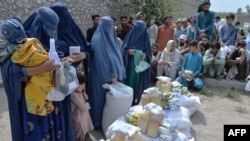The U.N. Food and Agriculture Organization warns millions of Afghans are at risk of starving if farmers do not receive the seeds they need to plant their winter wheat crop before the end of the month.
About 70% of all Afghans live in rural areas and depend on agriculture for their livelihoods. The Food and Agriculture Organization reports one in three people, or 14 million are suffering from acute hunger, with four million on the brink of famine.
The FAO director of emergencies and resilience, Rein Paulsen, says more than 20% of households are facing catastrophic gaps in their food consumption. He says malnutrition levels are soaring and many children risk dying.
Speaking on a video link from Pakistan’s capital Islamabad, Paulsen says Afghanistan’s critical winter wheat season is under threat. This, from the prevailing drought, as well as the many uncertainties due to the fluid political and military situation in the country.
He warns the window of opportunity to assist farmers for the fast-approaching winter wheat season is narrowing.
“Towards the end of September, we need to make sure that that planting is starting. There is a very short window of time to be able to address that. The seeds cannot wait, the farmers cannot wait. We need to do everything we can to ensure that those vulnerable households are supported,” he said.
Paulsen notes wheat is the most important cereal crop in Afghanistan, providing more than half of the population’s daily caloric intake. In addition to winter wheat, he says millions of Afghans also depend upon their livestock for survival.
“There are more than three million livestock at risk. We are approaching winter. Support to ensure that that livestock survives and thrives is vital. So, the drought has already posed a major threat to the livestock. The winter season is a challenge too. So, working with vulnerable herders, ensuring that feed, concentrate feed gets into the hands of those herders and farmers is vital,” he said.
FAO has supported more than 1.5 million people across 26 of Afghanistan’s 34 provinces this year. The agency says it plans to support another 1.5 million people with seeds, cash, and other aid for the rest of the year, but needs $15 million to do so.




